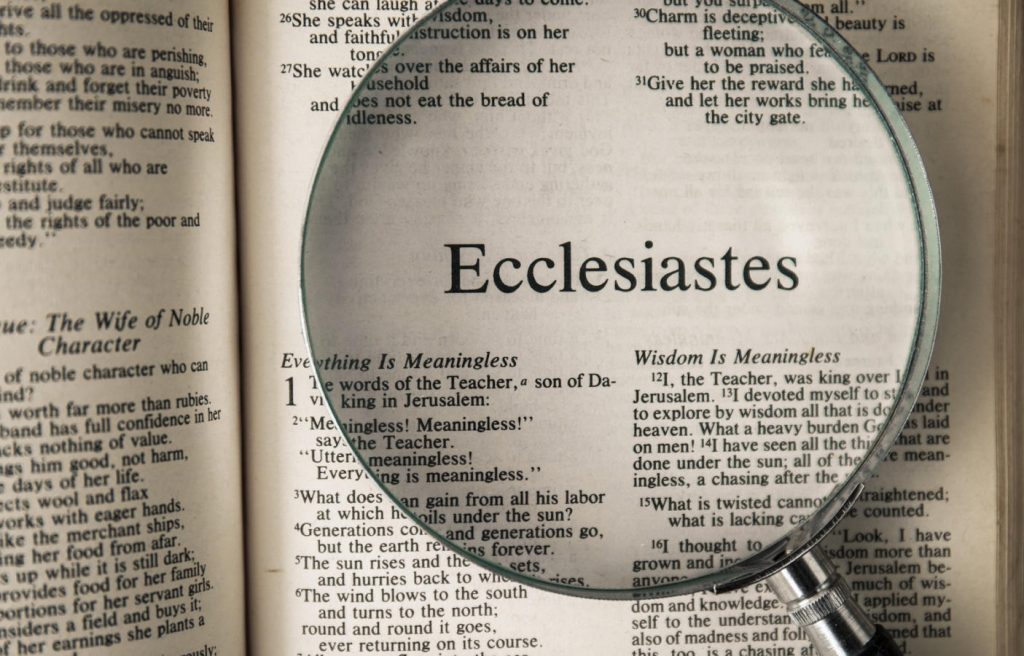Ecclesiastes is an ancient book of wisdom attributed to King Solomon of Israel. It is a reflection on the meaning of life and its value in light of the cycles of nature and the briefness of human life. The book’s main themes are the vanity of striving after wealth and power, the brevity of life, and the need to enjoy life. Ecclesiastes is filled with many famous quotes that have been inspiring people for centuries, such as, “There is nothing better for a man than that he should eat and drink, and make his soul enjoy good in his labor” and “The end of a thing is better than its beginning.”
36 Best Ecclesiastes Quotes

-
“There is no end to the making of many books, and much study is a weariness of the flesh.”
– Ecclesiastes 12:12
-
“A good name is better than precious ointment; and the day of death than the day of one’s birth.”
– Ecclesiastes 7:1
-
“For everything there is a season, and a time for every matter under heaven.”
– Ecclesiastes 3:1
-
“A time to be born, and a time to die; a time to plant, and a time to pluck up what is planted.”
– Ecclesiastes 3:2
-
“A time to weep, and a time to laugh; a time to mourn, and a time to dance.”
– Ecclesiastes 3:4
-
“A time to love, and a time to hate; a time for war, and a time for peace.”
– Ecclesiastes 3:8
-
“The race is not to the swift, nor the battle to the strong, nor bread to the wise, nor riches to the intelligent, nor favor to the skillful; but time and chance happen to them all.”
– Ecclesiastes 9:11
-
“He who observes the wind will not sow, and he who regards the clouds will not reap.”
– Ecclesiastes 11:4
-
“Cast thy bread upon the waters: for thou shalt find it after many days.”
– Ecclesiastes 11:1
-
“Live joyfully with the wife whom thou lovest all the days of the life of thy vanity, which he hath given thee under the sun, all the days of thy vanity: for that is thy portion in this life, and in thy labour which thou takest under the sun.”
– Ecclesiastes 9:9
-
“For in much wisdom is much grief: and he that increaseth knowledge increaseth sorrow.”
– Ecclesiastes 1:18
-
“I have seen all the works that are done under the sun; and, behold, all is vanity and vexation of spirit.”
– Ecclesiastes 1:14
-
“Vanity of vanities; all is vanity.”
– Ecclesiastes 1:2
-
“The thing that hath been, it is that which shall be; and that which is done is that which shall be done: and there is no new thing under the sun.”
– Ecclesiastes 1:9
-
“Whatsoever thy hand findeth to do, do it with thy might; for there is no work, nor device, nor knowledge, nor wisdom, in the grave, whither thou goest.”
– Ecclesiastes 9:10
-
“A man to whom God hath given riches, wealth, and honour, so that he wanteth nothing for his soul of all that he desireth, yet God giveth him not power to eat thereof, but a stranger eateth it: this is vanity, and it is an evil disease.”
– Ecclesiastes 6:2
-
“Go thy way, eat thy bread with joy, and drink thy wine with a merry heart; for God now accepteth thy works.”
– Ecclesiastes 9:7
-
“Let us hear the conclusion of the whole matter: Fear God, and keep his commandments: for this is the whole duty of man.”
– Ecclesiastes 12:13
-
“The words of the wise are as goads, and as nails fastened by the masters of assemblies, which are given from one shepherd.”
– Ecclesiastes 12:11
-
“One event happeneth to them all: the one event to the righteous, and the wicked; to the good and to the clean, and to the unclean; to him that sacrificeth, and to him that sacrificeth not: as is the good, so is the sinner; and he that sweareth, as he that feareth an oath.”
– Ecclesiastes 9:2
-
“The thing that hath been, it is that which shall be; and that which is done is that which shall be done: and there is no new thing under the sun.”
– Ecclesiastes 1:9
-
“For the living know that they shall die: but the dead know not any thing, neither have they any more a reward; for the memory of them is forgotten.”
– Ecclesiastes 9:5
-
“Two are better than one; because they have a good reward for their labour.”
– Ecclesiastes 4:9
-
“In the morning sow thy seed, and in the evening withhold not thine hand: for thou knowest not whether shall prosper, either this or that, or whether they both shall be alike good.”
– Ecclesiastes 11:6
-
“For if a man think himself to be something, when he is nothing, he deceiveth himself.”
– Ecclesiastes 12:8
-
“The heart of the wise is in the house of mourning; but the heart of fools is in the house of mirth.”
– Ecclesiastes 7:4
-
“The sleep of a labouring man is sweet, whether he eat little or much: but the abundance of the rich will not suffer him to sleep.”
– Ecclesiastes 5:12
-
“For that which befalleth the sons of men befalleth beasts; even one thing befalleth them: as the one dieth, so dieth the other; yea, they have all one breath; so that a man hath no preeminence above a beast.”
– Ecclesiastes 3:19
-
“A man hath no better thing under the sun, than to eat, and to drink, and to be merry.”
– Ecclesiastes 8:15
-
“He hath made every thing beautiful in his time: also he hath set the world in their heart, so that no man can find out the work that God maketh from the beginning to the end.”
– Ecclesiastes 3:11
-
“I have seen the travail, which God hath given to the sons of men to be exercised in it.”
– Ecclesiastes 3:10
-
“Let us lay aside every weight, and the sin which doth so easily beset us, and let us run with patience the race that is set before us.”
– Ecclesiastes 12:1
-
“All the rivers run into the sea; yet the sea is not full; unto the place from whence the rivers come, thither they return again.”
– Ecclesiastes 1:7
-
“He that loveth silver shall not be satisfied with silver; nor he that loveth abundance with increase: this is also vanity.”
– Ecclesiastes 5:10
-
“My son, fear thou the Lord and the king: and meddle not with them that are given to change.”
– Ecclesiastes 8:2
-
“For as the crackling of thorns under a pot, so is the laughter of the fool: this also is vanity.”
– Ecclesiastes 7:6
Conclusion
In conclusion, Ecclesiastes is a book of wisdom that speaks to the cyclical nature of life and the need to appreciate the little things. Ecclesiastes’ quotes offer a window into how we should prioritize and appreciate the simple pleasures of life. The book encourages us to live in the present and to make the most of our lives. Its teachings are timeless and can help us navigate the complexities of modern life.






